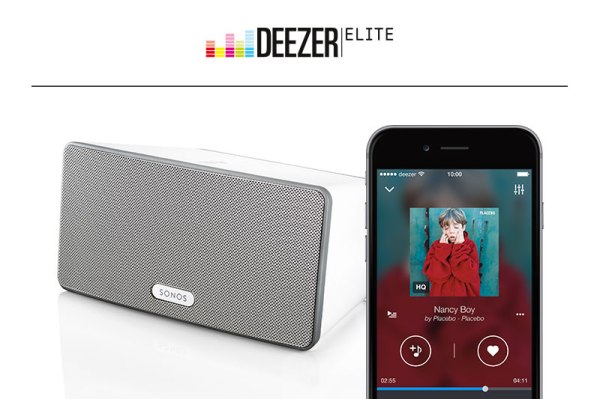Deezer, the music streaming service that competes against the likes of Spotify and Rdio with all-you-can-eat digital catalogues, is stepping up its strategy to target the higher end of the music market. Today it is rolling out a high-definition version of its service, called Deezer Elite, globally, initially in partnership with audio equipment company Sonos.
A version of the service was rolled out in the U.S. last October, as part of Deezer’s initial push into the U.S. market. Initially, the company says that it has picked up 200,000 new subscribers through the service, priced at a premium of $14.99 per month compared to Deezer’s regular subscription at $9.99 per month. Now, Deezer will be offering it everywhere else that it is active across Europe, North and South America and Asia — 180 countries in all.
The service is due to go live on March 19.
The move comes at a time when high-definition streaming music is hitting the news. Although Neil Young’s Pono service, which is tied to specific Pono hardware, has had a lukewarm launch, there is a company based in the Nordics called Aspiro that has suddenly caught people’s attention after a holding company controlled by music megastar Jay-Z made a bid to acquire its assets. They include the high-definition music services WiMP and Tidal. Aspiro, according to new figures published this week, currently has 503,000 users overall, with 17,000 on its Tidal service in markets like the U.S. and UK, and 24,000 on Wimp Hi-Fi.
Deezer currently has 16 million monthly active users and 6 million paid subscribers worldwide.
Elite’s growth comes at a time when Spotify has yet to launch any high-definition services:
“We’ve always offered our users several options when it comes to audio quality options. Some users might have bandwidth restrictions and therefore choose a lower bitrate, while Premium subscribers can enjoy high quality music at 320 kbps,” a spokesperson says. “Also, with more and more listening happening across mobile devices, we feel that we’ve found a good balance between bandwidth and quality. Currently, we don’t have plans to offer a higher quality option.”
Tyler Goldman, who runs Deezer in the U.S., tells me that this is the latest in a bigger strategy at Deezer to create products that cater to specific demographics.
“My belief is that music and audio services are all a bunch of niches,” he says. “But those niches are very large.” As part of this, Deezer has also moved aggressively into offering services to the lower end of the market (by way of its acquisition of Muve music assets from AT&T in January) and also those who favor spoken word rather than music (through its acquisition of Sticher last year).
It’s also not exactly a new strategy. Back in 2013, when Axel Dauchez was still at the helm of the company (he’s now been replaced), Deezer was focused on trying to figure out how to crack the long tail of music consumers.
Two of Deezer’s biggest demographics are 20-25 year-old male, tech friendly types; and 35+ male music lovers. In that context, he told me at the time, if you target a classical music lover a streaming service that you can hear on a phone, “It’s as weird as saying you can hear it on a pack of cigarettes,” he told me, holding up his own pack of Marlborough Lights. “It’s not relevant and it doesn’t make sense.”
That’s where the Sonos partnership fits in. While Elite will give users 35 million FLAC (Free Lossless Audio Codec) files (standard of 1,411 kbps or higher in any room), Goldman says that it will offer more than just this to sweeten the deal. Right now that includes being able to stream the service to other connected devices but he hints there may be more. These extra features are not being detailed at this time but as a clue, he said that Deezer will likely be delving deeper into music discovery and also focusing on specific music genres, such as classical music and jazz, which attract consumers looking for the highest-quality sound.
In Europe, Dezer says that Premium+ subscribers on Sonos can upgrade to Deezer Elite at no additional cost when subscribing for a full year, while those who are not can upgrade for €36 if committing to a year’s subscription. New user will be announced in March and will include a 30-day free trial, and is likely to be similar to pricing in the U.S. today.
